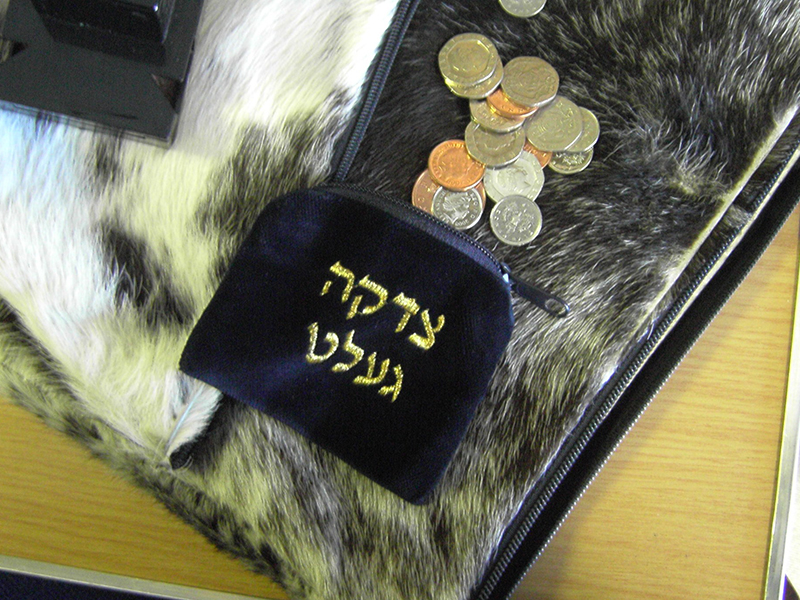Rabbi Chana bar Chanilai always kept his hand in his pocket so nobody would be embarrassed while waiting for him to get money for tzedakah. He kept wheat and barley outside his home so that those who were embarrassed could come and take by night. – Brachot 58b
Where do you keep your hands? Where do you keep your wheat?
Rosh Hashanah is well behind us, but another new year draws near, and with it comes the last-minute impulse to donate to charity. Or tzedakah. What’s the difference, anyway?
Trying to be somewhat provocative, Rabbi Yanki Tauber writes: “Don’t be misled by their legendary philanthropy, by their saturation of social and humanitarian movements, by their invention of the pushke, the meshulach and the UJA. Jews do not practice charity, and the concept is virtually nonexistent in Jewish tradition.”
Rabbi Tauber explains that, “Instead of charity, the Jew gives tzedakah, which means ‘righteousness’ and ‘justice.’ When the Jew contributes his money, time and resources to the needy, he is not being benevolent, generous or ‘charitable.’ He is doing what is right and just.”
Judaism 101 points out that, “The word ‘tzedakah’ is derived from the Hebrew root Tzade-Dalet-Qof, meaning righteousness, justice or fairness. In Judaism, giving to the poor is not viewed as a generous, magnanimous act; it is simply an act of justice and righteousness, the performance of a duty, giving the poor their due.”
In The Economics of Tzedakah, Rabbi Gary M. Bretton-Garanatoor, of New York’s Stephen Wise Free Synagogue, looks at the example set by Abraham: “We know little of Abraham’s early life, and one might wonder why Abraham was singled out to become God’s partner in the Covenant. We learn from the text that, ‘Vayach’shveha lo tzedakah – God considered Abraham on account of his righteousness.’ (Genesis 15:6)
Throughout the Torah, tzedakah, acts of righteousness, are tied to the Hebrew term mishpat – legal justice – so that we learn that doing what is right and just is a legal obligation.”
There is also an interesting discussion about how you should feel about giving tzedakah. Eliezer Abrahamson notes that “if one gives tzedakah to a poor person with a sour and unpleasant face, then he loses any merit from it, even if he gives ‘a thousand golden coins.’ Tzedakah must be given in a pleasant and compassionate manner.… If you have nothing to give you should appease the poor person with words.”
Dennis Prager adds that not feeling like giving is no excuse: “Judaism would love you to give 10 per cent of your income each year from your heart. It suspects, however, that in a large majority of cases, were we to wait for people’s hearts to prompt them to give a tenth of their money away, we would be waiting a very long time. Ergo, Judaism says, ‘Give 10 percent – and if your heart catches up, terrific. In the meantime, good has been done.’ ”
Speaking of attitude, take a look at Arthur Kurzweil’s Brother, Can You Spare a Dime: The Treatment of Beggars According to Jewish Tradition. Kurzweil says that although “the organized Jewish community has gotten the mitzvah of giving tzedakah down to a virtual science,” he has always been confused and inconsistent in his treatment of beggars. He poses 15 questions to ponder, such as: “Aren’t there better causes to give to than these people?”; “Shouldn’t these beggars be supported by official agencies?”; and “Should I buy them a cup of coffee because they’ll probably spend it on booze anyway?” Kurzweil, who is not a rabbi but a well-known Jewish genealogist, clearly spent a great deal of effort sifting through traditional sources, which clearly demand compassion for the needy.
Just-Tzedakah has a detailed look at giving from a Jewish point of view. While the theoretical halachic minimum for giving is about $2, this only applies to someone who is living in abject poverty. The site suggests that most people contribute 10 to 20 per cent their net income in a given year. Other tzedakah recommendations from the site: calculate your obligation with care; don’t brag; avoid delay; and give cheerfully and with compassion.
There may never be enough money for all the worthy institutions and individuals who deserve it. But Brandeis University Professor Reuven Kimelman suggests that the recipient of the donation is not the only one who gains: “Tzedakah may not save us, but it makes us worth saving.”
